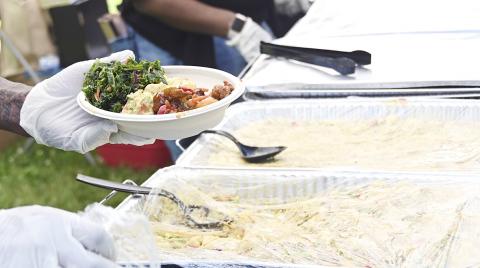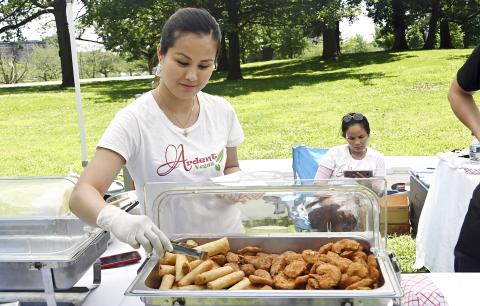Vegetarians have a lower risk of coronary heart disease than meat-eaters but a greater risk of having a stroke, researchers have found.
Meat-eating has been decried as damaging for the environment, while there are also health concerns: the World Health Organization has classed processed meat as a cause of cancer , and red meat as a probable cause. But as alternative diets take off , researchers say further scrutiny is important.
“Vegetarian and vegan diets have increased hugely in popularity over the past years, but we actually know very little about the potential health benefits or hazards of these diets,” said Tammy Tong, first author of the study from the University of Oxford.

Photo: AP
Writing in the British Medical Journal , Tong and colleagues report that they analysed data from more than 48,000 adults who signed up to a wider study between 1993 and 2001, and who had no history of heart attack, stroke or angina.
As well as being asked questions on lifestyle and medical history, on joining the study participants were also quizzed about their diet, allowing the team to classify individuals as meat-eaters, vegetarians, vegans or pescatarians. Some of these questions were asked again in 2010 and participants were re-classified if they had switched diet. As the study involved very few vegans, these individuals were grouped with vegetarians in the analysis.
The health of participants was followed through medical records until March 2016, during which time there were 2,820 cases of coronary heart disease and 1,072 cases of stroke.

Photo: AP
The results reveal that once factors including age, sex, smoking status and socioeconomic status were taken into account, fish eaters had a 13 percent lower risk of coronary heart disease than meat-eaters, while vegetarians had a 22 percent lower risk.
Meanwhile, vegetarians had a 20 percent higher risk of having a stroke than meat-eaters. There was no clear effect for fish-eaters.
Overall, the findings mean that over a 10-year period, there would be 10 fewer cases of coronary heart disease in vegetarians than in meat eaters per 1,000 people, and three more cases of stroke.
While the latest study does not prove that meat-eating or vegetarianism is behind the differences in risk, Tong said the association between a vegetarian diet and coronary heart disease supports previous research.
“It was likely that the lower risk in both pescatarians and vegetarians are related to the fact that they have lower cholesterol, but also a lower BMI, lower blood pressure and also a lower rate of diabetes,” she said.
Tong suggested one reason vegetarians might have a higher risk of stroke could be due to lower levels of cholesterol, which could increase the risk of certain types of stroke. Alternatively, the association might be down to vegetarians having lower levels of certain nutrients, such as vitamin B12.
However, others said the data suggested that was unlikely.
“It may well be that people who follow alternative diets are less likely to take blood pressure lowering medication for hypertension and as a consequence suffer a stroke,” suggested Tom Sanders from King’s College London.
The study has limitations, including the fact that it is based on self-reporting, and that not all participants answered questions in 2010. The study also mainly involved white people living in the UK, so it is not clear whether the results would hold in other populations.
Dr Frankie Phillips, a dietitian from the British Dietetic Association, said vegetarians and vegans should not be alarmed by the results, stressing that the study does not show cause and effect.
Instead, Phillips said, everyone could benefit from eating more plants.
“That doesn’t necessarily mean becoming completely vegan or vegetarian,” she said, adding that having a wide range of foods in the diet ensured it provided all the necessary nutrients.

June 23 to June 29 After capturing the walled city of Hsinchu on June 22, 1895, the Japanese hoped to quickly push south and seize control of Taiwan’s entire west coast — but their advance was stalled for more than a month. Not only did local Hakka fighters continue to cause them headaches, resistance forces even attempted to retake the city three times. “We had planned to occupy Anping (Tainan) and Takao (Kaohsiung) as soon as possible, but ever since we took Hsinchu, nearby bandits proclaiming to be ‘righteous people’ (義民) have been destroying train tracks and electrical cables, and gathering in villages

Dr. Y. Tony Yang, Associate Dean of Health Policy and Population Science at George Washington University, argued last week in a piece for the Taipei Times about former president Ma Ying-jeou (馬英九) leading a student delegation to the People’s Republic of China (PRC) that, “The real question is not whether Ma’s visit helps or hurts Taiwan — it is why Taiwan lacks a sophisticated, multi-track approach to one of the most complex geopolitical relationships in the world” (“Ma’s Visit, DPP’s Blind Spot,” June 18, page 8). Yang contends that the Democratic Progressive Party (DPP) has a blind spot: “By treating any

Swooping low over the banks of a Nile River tributary, an aid flight run by retired American military officers released a stream of food-stuffed sacks over a town emptied by fighting in South Sudan, a country wracked by conflict. Last week’s air drop was the latest in a controversial development — private contracting firms led by former US intelligence officers and military veterans delivering aid to some of the world’s deadliest conflict zones, in operations organized with governments that are combatants in the conflicts. The moves are roiling the global aid community, which warns of a more militarized, politicized and profit-seeking trend

This year will go down in the history books. Taiwan faces enormous turmoil and uncertainty in the coming months. Which political parties are in a good position to handle big changes? All of the main parties are beset with challenges. Taking stock, this column examined the Taiwan People’s Party (TPP) (“Huang Kuo-chang’s choking the life out of the TPP,” May 28, page 12), the Democratic Progressive Party (DPP) (“Challenges amid choppy waters for the DPP,” June 14, page 12) and the Chinese Nationalist Party (KMT) (“KMT struggles to seize opportunities as ‘interesting times’ loom,” June 20, page 11). Times like these can